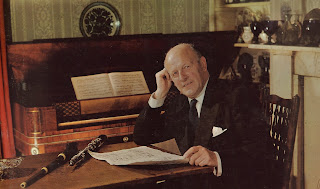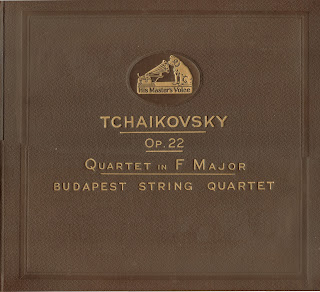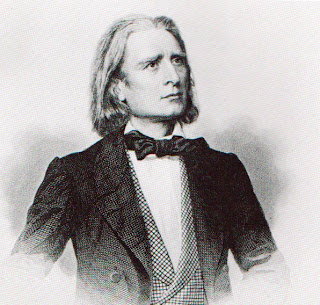The National Gramophonic Society was founded in 1923 by Compton Mackenzie, under the aegis of his new magazine, "The Gramophone." Its aim was to promote and record complete works of chamber and instrumental music that had hitherto been neglected by the major record companies as being unprofitable.
In my heyday as a collector I had about a dozen of these sets, including the very first issue which is pictured above. Either through borrowing copies back or working from tapes I had made, I managed to upload nine such sets in 2007-08; three of these I have already posted on this blog. This is to be the first of two posts to take care of the others. Here are four acoustically-recorded sets:
Beethoven: Quartet No. 10 in E-Flat, Op. 74 ("Harp")
Spencer Dyke String Quartet
Recorded July 30, 1924, by Columbia
National Gramophonic Society A, B, and C, three 78-rpm records
Link (FLAC files, 72.2 MB)
Link (MP3 files, 27.48 MB)
Schoenberg: Verklärte Nacht, Op. 4 (version for string sextet)
Spencer Dyke String Sextet
and
Schubert: Piano Trio No. 2 in E-Flat, Op. 100
Harold Craxton, Spencer Dyke and B. Patterson Parker
Recorded October 10 and December 30, 1924, and January 7, 1925, by Columbia
National Gramophonic Society H, I, K, L, M, N, O, and P, eight 78-rpm records
Link (FLAC files, 198.73 MB)
Link (MP3 files, 69.9 MB)
Brahms: String Sextet No. 1 in B-Flat, Op. 18
Spencer Dyke String Sextet
Recorded May, 1925, by Parlophone
National Gramophonic Society Z, AA, BB, CC, and DD, five 78-rpm records
Link (FLAC files, 83.87 MB)
Link (MP3 files, 33.06 MB)
Eugene Goossens: Two Pieces for String Quartet, Op. 15;
Orlando Gibbons: Fantasias Nos. 6 and 8;
Purcell: Four-Part Fantasia No. 4 in C minor
Music Society String Quartet
Recorded May, 1925, and February, 1926, by Parlophone
National Gramophonic Society DD, FF, and BBB, three 78-rpm records
Link (FLAC files, 43.17 MB)
Link (MP3 files, 16.35 MB)
These were first recordings of all the works concerned, and in the case of the Schoenberg, probably the first recording of any of his music. It should be mentioned that the cellist in the Music Society String Quartet was none other than John Barbirolli, some of whose earliest recordings as a conductor were made for the N.G.S. and can be heard at the
CHARM website.


































